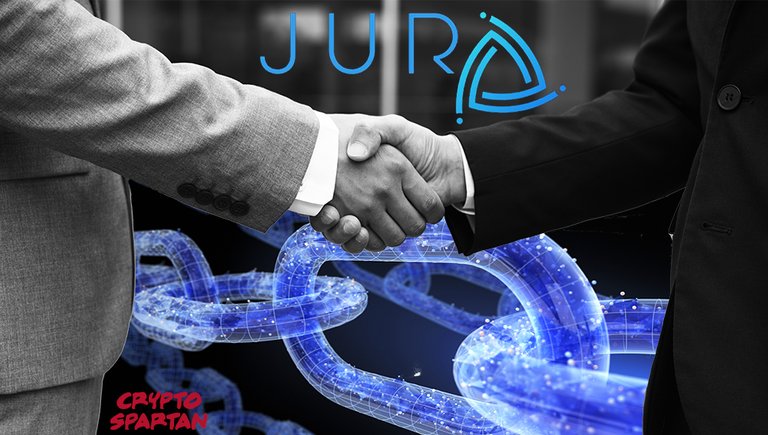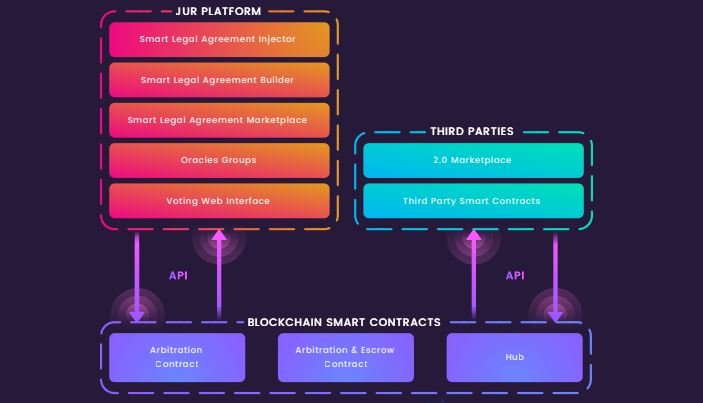
Overview & Vision
As new waves of technological innovation sweep across the globe, traditional structures dictating the way we live and work are challenged and often disrupted as we discover increasingly beneficial means of interaction and collaboration with one another; the age of the internet of data has facilitated global access to information and has revolutionised communication, in the process birthing a new generation of remote workers and freelancers, and now the internet of value (i.e. blockchain) is facilitating the creation of the collaborative decentralised economy- and thus new dimensions of financial collaborative autonomy.
However, whereas many technological movements facilitate progress in terms of advancing global interaction and collaboration, most industries suffer from one common problem hindering market participants on this front: the inherent lack of trust between parties. If parties wish to collaborate (be they individuals wishing to conduct an OTC crypto trade, or a company wishing to employ the services of a freelancer, for example), there is no effective yet cost-effective way to create secure agreements, resolve disputes and enforce resolutions; current legal structures and private resolution systems are plagued by high costs, gross inefficiencies and long delays- making them largely inaccessible and unfeasible as a solution for many.
Essentially, what’s vitally lacking is the means for participants across many industries to confidently collaborate and establish valuable cooperative relationships in a cost-effective and verifiably secure way.
This problematic situation is the call to action for Jur, who are endeavouring to create a next-gen collaborative ecosystem, designed to facilitate the secure and cost-effective creation and execution of legal agreements. With an integrated advanced escrow service and a consensus-based decentralised dispute resolution mechanism which utilises economic incentives alongside game theory, platform users will be provided with an affordable, efficient and fair collaborative experience. In a nutshell, Jur are leveraging the new functional possibilities and inherent security-related properties of blockchain technology with the vision to ultimately facilitate a new age of frictionless trust between global market participants.
There are striking use-cases here in the areas of OTC crypto trades, ICO marketing services and ICO investing, and all types of freelance work agreements.
Welcome to the era of blockchain-powered justice-as-a-service.
Current Problematic Situation
Mutually-beneficial collaboration between companies and individuals alike is being stifled by the shortcomings of traditional dispute resolution systems.
Current contract agreement and dispute resolution systems involving traditional legal structures are often painfully inefficient and prohibitively expensive. Contract creation is inherently slow and the cost of resolving disputes often exceeds potential financial gain; in the current environment, there is rarely a cost-effective way to resolve disputes and enforce agreements for parties of a dispute regarding a value of $1000 or less. Even when traditional legal measures are financially viable, the antiquated and inefficient structure of the legal system means drawn-out and costly contract creation and resolution of disputes- hindering business operations, innovation and ultimately economic growth.
There are, of course, private alternative means of making agreements and facilitating resolutions, however such centralised solutions often are also costly and offer only partial functionality within the process. For instance, there are a range of online and offline escrow solutions available to act as a third-party guarantee system. They jump at the chance to do so. Why? Because they’re expensive. As are review-based freelancer websites such as Fiverr and Freelancer.com. Such solutions rely on a centralised actor to facilitate the payment transfer process and manage any potential disputes themselves, charging a notable fee in the process and not allowing for real autonomy of the user over the customisation of agreements. Relying on the actions of a centralised third-party also carries inherent operational inefficiencies and security weaknesses.
Smart contracts offer the technological basis for a viably cost-effective and efficient solution, but in themselves are not sufficient to solve the problem; self-executing decentralised smart contracts stand to revolutionise many types of clearly defined automated transactions (such as IoT machine-to-machine payments), however they traditionally lack the means to resolve disputes necessary when dealing with the agreements of subjective parties. In other words, whenever people are involved in making agreements, there will inevitably be some mediation required during a certain percentage of the encounters.
Smart contracts can’t mediate by themselves.
This overall situation results in the exclusion of many individuals and companies alike when it comes to addressing disagreements and injustices, and a huge base of underserved and unsatisfied current market participants. It’s the presence a verifiably secure and provably fair mechanism for collaboration and mediation which has traditionally been so sorely lacking.
That is, until now.
Jur’s Solution
Jur aim to revolutionise industry collaboration (be that between business or individuals) through their innovative platform- providing a blockchain-powered next-gen ecosystem for collaboration and dispute resolution. Jur will essentially facilitate the creation of legal agreements, management of related transactions, and the solving of disputes in a more cost-effective, fair and efficient way than was possible in the pre-blockchain era. In the process, new collaborative cooperation will be facilitated, and industry relationships enabled to thrive.

Jur platform architecture, taken from their whitepaper: https://jur.io/content/uploads/2018/07/JUR-WhitePaper-v0.3-eng.pdf
The team is approaching the situation at a fundamental technical level in order to create this new dimension of confident trust between parties, enforced by blockchain and enabled by community participation.
Blockchain Framework & Smart Contract Agreements
Blockchain is the functional framework that is allowing Jur to transform conventional legal structures into digital legal mechanisms; the transparent nature and decentralized structure of the blockchain will play a crucial role in the creation of Jur’s next-gen solution for dispute resolution and smart contract creation.
Agreements between parties will be created with the use of blockchain-enabled smart contracts, which will also be utilised if escrow is required during the process- making verifiably sure that the correct amount of funds have been securely received by each party, depending on the terms of the agreement. Agreements can be seamlessly and securely mutually amended by the parties, offering an advanced level of contractual flexibility. If and when the contract terms are met in a manner that is satisfactory for both collaborators, each would confirm this is the case and the smart contract would automatically release the locked funds to the correct party.
The result is a reliable, swift, cost-effective contractual agreement creation mechanism which will ultimately enable greater freedom for industry participants to confidently collaborate. This level of verifiable, secure and confident collaboration can only be ensured through the use of blockchain.
Not all agreements between individuals or organisations will run smoothly, however, and some will inevitably require mediation. This is where Jur’s decentralised community of ‘Oracles’ (dispute resolution voters) come into play.
Consensus-Based Dispute Resolution
Being a decentralized solution, Jur’s ecosystem is community-powered and relies on the participation of various actors to maintain a healthy, active and fair platform. This is especially true in the area of dispute resolution, which Jur have systematically designed using economic incentives and game theory to be verifiably transparent and fair.
Aside from the platform users themselves using Jur to enter into contractual agreements, the Jur ecosystem will also be home to the community of voluntary ‘Oracles’ whose crucial role is to vote on which proposed solution is most fair in the case of contractual disputes. In such a case, both parties from the agreement will propose a resolution they believe to be fair given the specifics of the situation, and wait for the voting period in which Oracles cast their votes (a default time limit of 24 hours) to be completed. In most cases, anybody with JUR tokens is able to vote on the resolution and therefore act as an Oracle, and the party with the most votes wins the dispute. The blockchain-powered smart contract then enforces the winning resolution and securely settles the agreement.

Example of the voting process, taken from the Jur website. In this scenario, Alice wins the vote and thus her resolution will be enacted: https://jur.io/
If you’re wracking your brains trying to work out how this mechanism can amount to a truly consistently fair system, verifiably free from manipulation or malicious action- so was I. The answer lies in Jur’s ingenious leveraging of economic incentive combined with game theory. Those who vote for the losing resolution forfeit their tokens, whilst voters of the winning resolution gain the forfeited tokens. It would be illogical for one of the parties under dispute to attempt to influence the procedings through their own vote, since the value of votes cast can easily amount to far greater than the amount under dispute. Therefore, choosing what is perceived by each Oracle to be the most objectively ‘fair’ outcome is the only logical behaviour of the crowd and any intentionally malicious (or illogical) activity will most likely be punished with the forfeiture of tokens by the system’s very design.
Token Utility
The platform will house a native token, JUR, to act dually as a payment and utility token. JUR will be used as a means of value transfer within the escrow process, being the default currency in which the escrow is denominated in a Jur Contract Agreement. Jur platform fees for users taking advantage of paid features and services (such as purchasing premium contract templates from the Marketplace) will also be paid in JUR tokens. In terms of platform functionality, JUR provides the utility to solve any disputes within the Jur Agreement Contract- it is with JUR tokens that platform users will be able to participate in the voting process.
The JUR token sale information is yet to be finalized, however whitelisting is currently available on the Jur website.
Team Overview & Ecosystem Expansion Strategy
When evaluating any project in the Wild West of crypto, as I always say ensuring that the team has the experience and capability required to carry out the vision they are outlining is crucial. It’s important to remember that anybody can produce an impressive whitepaper and create a persuasive website; the idea is the easy part, it’s implementing the idea which is difficult. For a project such as this- with a mission as grand as redefining legal agreements and collaborative relationships through technological innovation- I’d hope to see not only a capable and varied team at the helm, but also a proactive plan to ensure the solid foundation of the fledgling ecosystem as it begins to take flight.

Jur team snapshot, taken from their onepager: https://jur.io/content/uploads/2018/11/OnePager.pdf
Jur does not disappoint. The experienced core team consist of individuals with extensive cross-industry expertise, including in the legal technology, blockchain and marketing sectors. Jur is not only heavy on technical expertise but also community management experience, with cofounder Filippo Schiano Di Pepe having previously built a community of over 75,000 architects through his start-up Gopillar. It is therefore not surprising to learn that the Jur team have developed a strategically calculated onboarding and adoption strategy, consisting of an ‘adoption drop’ of 5 percent of JUR tokens, in order to onboard many of the initial ecosystem participants and to kick-start a quality, active and dynamic participant ecosystem from the very beginning.
Verdict & Summary
There’s something sorely missing from the traditional legal system: the means for participants across many industries to confidently collaborate with one another and establish valuable cooperative relationships in a cost-effective and verifiably secure way. The most ground-breaking industries suffer the most, such as the blockchain space and freelance sector, due to a lack of established secure mechanisms of interaction.
Jur is leveraging blockchain and smart contract technology to create a next-gen platform for the creation of legal agreements, management of related transactions, and the solving of disputes in a cost-effective, functional and efficient way. Smart contracts will ensure security and verifiability within the agreement and transaction process, and a systematic decentralised consensus mechanism ensures fair and efficient dispute resolution. The experienced and varied Jur team is approaching the situation at a fundamental technical level in order to facilitate a new dimension of confident trust between parties, enforced by blockchain and enabled by community participation.
The result is to be a reliable, swift, cost-effective contract creation and dispute resolution system which will ultimately enable greater freedom for industry participants to confidently collaborate. This level of securely verifiable, functional and confident collaboration would not have been possible in the pre-blockchain era.
This is the age of blockchain-powered justice-as-a-service, and Jur’s exciting journey towards greater collaborative freedom and security begins here.
Have any questions regarding Jur? Join their active community on Telegram where you can discuss anything Jur -related: https://t.me/jurcommunity
Learn more at their website: https://jur.io/
Dig in deeper with Jur's whitepaper: https://jur.io/content/uploads/2018/07/JUR-WhitePaper-v0.3-eng.pdf
Get connected to Jur on social media:
Twitter: https://twitter.com/jurproject
Facebook: https://www.facebook.com/JurNetwork/
Disclaimer: this is not financial advice in any form, it is my opinion and insight based on research and you should always do your own research before committing to anything financially whatsoever.
kind of like an decentralized escrow but with more, I like it
Nice read!! Great detail, a bit long for me but I got there in the end :D From what I can see, it's not going to replace legal proceedings but will offer an alternative for people who can't afford proper contracts or fighting cases. Could have a great use case there!! Is it legally binding?
Thanks for your support! I know, and there are a lot more details on the voting mechanism etc. which I decided to omit even at that! That's right, Jur wouldn't replace all contractual legal procedures, but will expand the accessibility of such proceedings greatly- for example a high value B2B agreement would go through the traditional legal system, but for disputes of a value under $1000, say, it would not really be financially viable to do so. In these types of cases, Jur would be an exceptionally useful solution. This could open up the opportunities for secure and efficient collaboration and dispute resolution MASSIVELY.
And is it legally binding?
Yep, the Jur Smart Agreement is a legally binding contract.
Well, it's an interesting concept, but forgive me if I'm a bit skeptical. Then again a certain degree of "reasonable professional skepticism" is a good thing to bring to the table in any legal matter, eh?
You do have a very good point about the current legal dispute resolution system being hopelessly broken.
Very true, and wise, in this market especially skepticism is the aim of the game!
I think it's important to keep a level head in terms of disruptive potential for all these ventures into new arenas for blockchain, but also to recognise potential on different levels. In the cae of Jur, it's not going to replace the traditional legal system, but it might alleviate some of the problems leading to legal proceedings in the first place. I can definitely see how it would provide a more accessible alternative for parties to be able to enter into confidently secure agreements rather than needing to rely on traditional structures.
That said, adoption is KEY- you can't have a community-powered platform without the community, and right now that's one of the biggest challenges for new project so will be one of the toughest hurdles in my opinion. This market is not kind to newcomers right now!
Thanks Spartan, quality as always! no video I see for this one?
Thanks for your support! Video is uploading as we speak!
This post has received a 18.13 % upvote from @boomerang.
What are the token sale detail
Token sale information is yet to be finalized, however whitelisting is currently available on their website for those waiting.
Hmmm I have mixed feelings on this one- real interesting just trying to wrap my head around use cases in the real world. I can't see it replacing freelancing websites like Fiverr, they're too well established and attract people as a type of marketing platform for their own services.
However, think of the use cases in the crypto space, could be eextremely useful! Even just for OTC crypto trades, I don't know of one decentralised solution for trading between another party (if the coin isn't on idea). Guaranteed OTC crypto trades- I'd use for that.
Agreed about the OTC trades- that's something people in the space can appreciate from the outset.